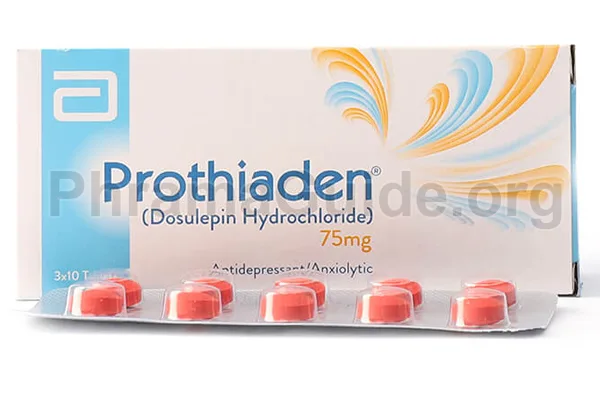Prothiaden tablet is primarily used to treat depression and anxiety disorder. It is a tricyclic antidepressant used to treat major depressive disorder and other mood disorders.
Prothiaden is commonly used in conditions such as:
- Depression
- Generalized Anxiety Disorder
- Obsessive-Compulsive Disorder (OCD)
- Bipolar Disorder
- Post-traumatic Stress Disorder (PTSD)
- Premenstrual Dysphoric Disorder (PMDD)
- Panic Attacks
- Cytotoxic Chemotherapy
- Nausea and Vomiting
Off-label Uses of Prothiaden Tablet
In some cases, Prothiaden tablets may be used off-label for other conditions such as:
- Chronic Pain
- Neuropathy
- Migraines
- Insomnia

What is Prothiaden?
Prothiaden is one of the leading brands of Dosulepin Hydrochloride, manufactured and marketed by Abbott Laboratories.
Prothiaden Alternatives : Other Similar Brands
There is no alternative brand of Prothiaden available in Pakistan, but the international market has its alternative brands.
The followings are some of them:
- Exodep : Sun Pharmaceutical Industries Ltd.
- Dosul : D D Pharmaceuticals (Pvt) Ltd.
- Dotin : Tsmed India (Pvt) Ltd.
- Dothin : Reliance Formulation (Pvt) Ltd.
- Osule : Quince Lifesciences (Pvt) Ltd.
- Depnoc : Mova Pharmaceuticals (Pvt) Ltd.
- Thpin : Solitaire Pharmacia (Pvt) Ltd.
Prothiaden : Available Formulations and Strengths
Presently, Prothiaden is available in Tablets Form
Prothiaden Tablets : 25mg, and 75mg strengths
Who Should Not Use Prothiaden?
There are some important contraindications that should be considered before using the Prothiaden tablets.
- Hypersensitivity: Individuals who have known hypersensitivity or allergic reactions to Prothiaden or any of its components should avoid its use.
- Recent myocardial infarction (heart attack): Prothiaden is contraindicated in individuals who have recently experienced a heart attack due to the potential risk of arrhythmias and other cardiovascular complications.
- Concurrent use of monoamine oxidase inhibitors (MAOIs): Prothiaden should not be used in combination with or within two weeks of discontinuing MAOIs, as this may increase the risk of serotonin syndrome, a potentially life-threatening condition characterized by high levels of serotonin in the brain.
- Acute recovery phase following myocardial infarction: Prothiaden is contraindicated during the acute recovery phase following a heart attack due to the potential risk of arrhythmias and other cardiovascular complications.
- Angle-closure glaucoma: Prothiaden should be used with caution in individuals with angle-closure glaucoma, a specific type of glaucoma characterized by increased pressure within the eye, as it may exacerbate this condition.
- Severe hepatic impairment: Prothiaden is primarily metabolized in the liver, and caution should be exercised and dosage adjustments considered in individuals with severe hepatic impairment.
- Pregnancy and breast-feeding: Prothiaden is generally not recommended during pregnancy and breastfeeding due to limited information on its safety in these conditions. The potential risks and benefits should be carefully evaluated by a healthcare professional.
What is the Recommended Daily Dosage of Prothiaden?
Prothiaden Dose in Depression:
- 1 – 2 Tablets of 75mg once a day, the doctor may increase the dose up to one tablet of 75mg 3 times a day.
Prothiaden Dose in Migraines:
- Initially: one tablet of 25mg once a day and gradually increased the dose to one tablet of 25mg 3 times a day.
Prothiaden Dose as an Antiemetic:
- one tablet of 25mg once or twice daily with food.
How Prothiaden Works?
Prothiaden contains Dosulepin (also known as dothiepin) a tricyclic antidepressant (TCA) drug that works by affecting the levels of certain neurotransmitters in the brain.
- Serotonin: Prothiaden blocks the reuptake of serotonin, a neurotransmitter involved in the regulation of mood, sleep, appetite, and other functions. By inhibiting the reuptake, Prothiaden increases the concentration of serotonin in the synaptic cleft, allowing for enhanced neurotransmission and potentially improving mood, and reducing depressive symptoms.
- Noradrenaline: Prothiaden also inhibits the reuptake of noradrenaline, another neurotransmitter involved in mood regulation, arousal, and stress response. By blocking the reuptake of noradrenaline, Prothiaden increases its concentration in the brain, which may contribute to its antidepressant effects.
- Acetylcholine: Prothiaden also exhibits anticholinergic properties, meaning it blocks the action of acetylcholine, a neurotransmitter involved in various functions in the body.
- Histamine H1: Prothiaden has antihistaminic properties and blocks histamine H1 receptors. This may contribute to its sedative effects.

Leave A Comment